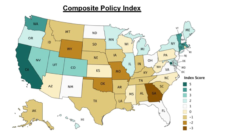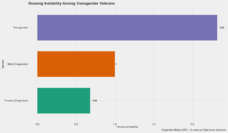Suicide is one of the most pressing challenges facing the trans community. Up to 40% of transgender adults attempt suicide during their lifetime, nine times more often than the general US population. A staggering 92% of those who attempt suicide do so before age 25. Some legislators are trying to block a critical pathway to suicide prevention for trans young people: gender-affirming healthcare.
Across the US, state legislators proposed 19 bills that ban gender-affirming care for minors last year, seen above in orange. The bills criminalize health care options, including puberty blockers, hormone replacement therapy, and gender-affirming surgeries. Most of these bills target health care providers, threatening fines, lengthy prison sentences, and revoked licenses. If passed, Missouri’s bill would automatically report any parent who affirms their child’s trans identity with medical care to Child Protective Services for child abuse. A bill proposed in January in Mississippi bans gender-affirming care, not just for minors, but for anyone up to age 21.
Puberty blockers, medications that are the most common clinical intervention for transgender minors, provide time for youth, their guardians, and health care providers to explore other potential transition steps. The blockers delay the onset of puberty by suppressing estrogen or testosterone production, and their effects are completely reversible. If teenagers would like to live as their assigned sex, they can stop using blockers and let natal puberty run its course. If they want to continue transition, they can begin hormone replacement therapy, usually at age 16 or older.
Using the largest-to-date survey of transgender individuals in the US, Jack Turban and team explored puberty suppression and adult suicidality. While 17% of the adults in the study reported that they had wanted pubertal suppression during their teenage years, less than 3% actually received treatment. Transgender adults who took puberty blockers were less likely to experience suicidal ideation compared to transgender adults who desired, but did not receive, pubertal suppression.
Current bills to ban healthcare for transgender youth — which would disallow the prescription of puberty blockers–fly in the face of science and medical expertise. None of these bills are currently standing law, but lawmakers across the country are looking to change that in 2021. Gender-affirming care is suicide prevention, and legislators who deny healthcare to trans youth put these youths’ lives at terrible risk.
Databyte via “Trans Rights Under Attack in 2020.” American Civil Liberties Union. 2020.














